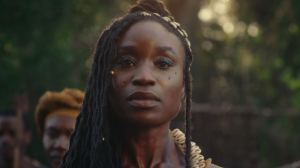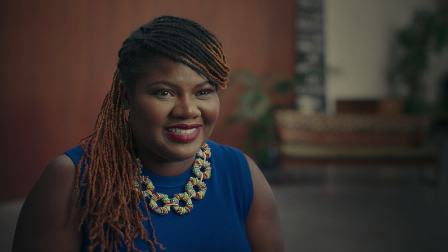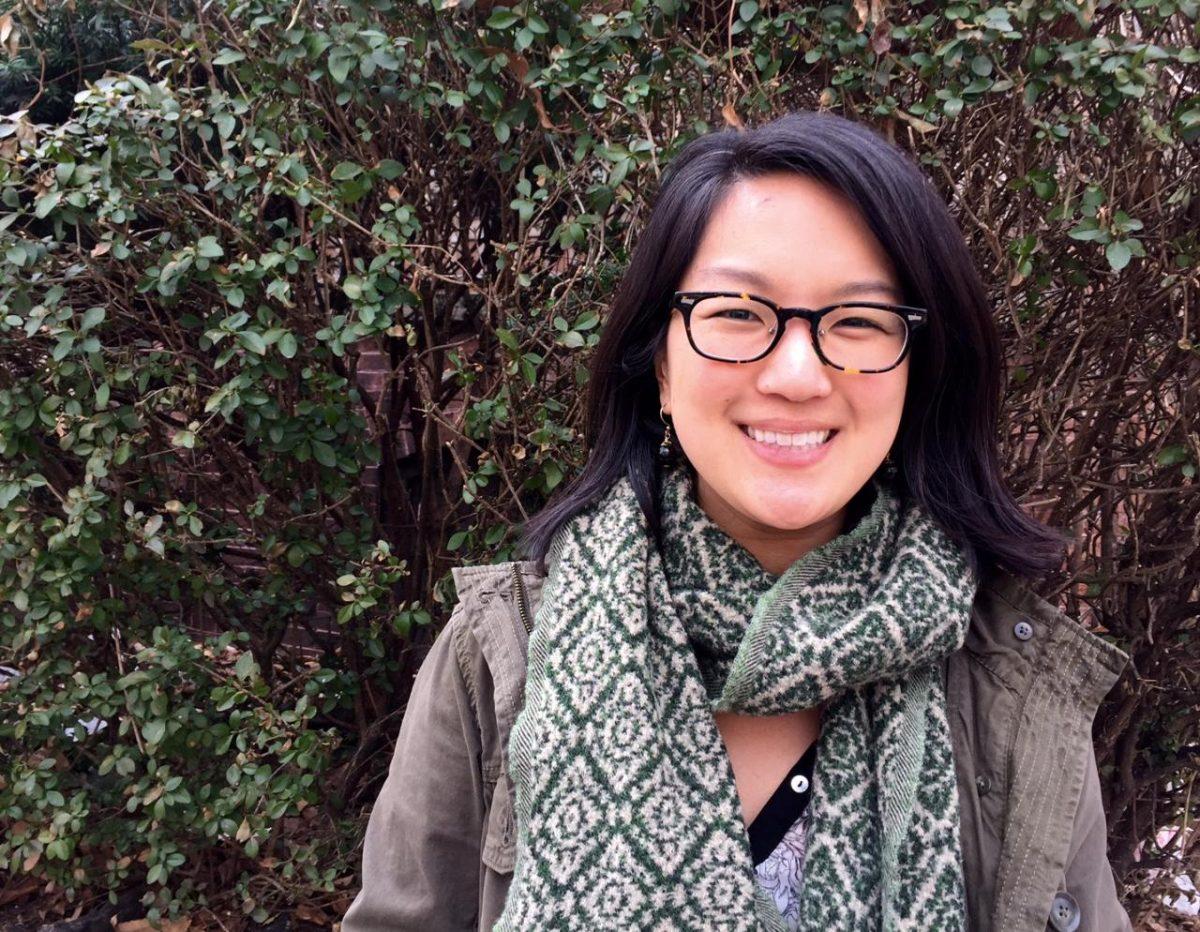A critical department within Wellesley College, Africana Studies is making waves, even beyond the world of academia. In the basement of Founders lies the Africana Studies Department, including the office of Professor Kellie Carter Jackson, who is one such professor making waves.
Recently featured in Netflix’s new series, “African Queens: Njinga,” Carter Jackson was called into the project as an expert on Queen Njinga, the first woman king of the 16th century Ngolo region of Africa who fought against the slave trade.
“I think the first time I got goosebumps was when I watched the trailer because I did not expect to be in the trailer,” said Carter Jackson. “I’m in it twice, which is wild to me.”
Executive produced and narrated by Jada Pinkett Smith and starring Adesuwa Oni as Njinga, the project is significant in many ways. For one, it brings the work of scholars to the forefront — most notably, the work of Boston University Professor of African American studies and history Linda Heywood, who wrote the book on Queen Njinga. Carter Jackson uses Heywood’s book in her own class, but as she notes, she can only reach 15 to 20 students at a time, while Netflix’s reach is far more expansive. Using Netflix as a platform to convey Queen Njinga’s story also increases accessibility.
With this series, Queen Njinga’s legacy leaps outside “the bounds of the ivory towers of academia,” allowing it the opportunity to reach anyone with access to the streaming service. This is a step into transforming years of research from scholars into a more digestible form, conveyed through poignant visuals — adding a new format to learn from in addition to academic texts and podcasts. But being a docudrama, the series still adheres to scholarly roots, which is where Carter Jackson comes in.
“What I love about it is that it’s the best of both worlds,” said Carter Jackson. “You get the drama that you would get in ‘Game of Thrones,’ but you also get the history. Historians and experts are backing up what you’re saying. … .We are sort of your Google or your Wikipedia. We give you the historical context, we tell you what’s happening and why it matters. And so you can enjoy it while you’re watching it, but you can also learn something new.”
The docuseries format melds the informative and entertaining in a way that simultaneously values accuracy and storytelling.
“I think you had to have something like this because very few people know who Queen Njinga was,” Carter Jackson explained. “This was the first moment where she’s being introduced to the public in a major feature. So I think for everyone who was involved, it was really important that we be honest and factual about what happened and that we tried to stay as close to the historical texts as possible.”
Because the series is based on historical events, Carter Jackson noted that not everything can be fully accurate because historians do not know every detail. They can, however, make educated guesses based on available scholarly work and historical evidence to create the most authentic visual representation possible. The inclusion of these details adds texture and nuance to the series.
Beyond her role as a historian, Carter Jackson has a story of how she became involved in production. Called up by producers about a year ago because of her experience teaching about Queen Njinga, she was soon invited to fly to London to film.
“We filmed in this really cool studio. It was all day long. And they peppered me with questions about Queen Njinga,” she recounted.
Under a barrage of questions for both the pre-interview — during which she helped filmmakers get a better idea of what the film should look like, from costuming to time period accuracy and more — and the interview itself. Though she often teaches about Queen Njinga, Carter Jackson still took time to prepare for this process, rereading Heywood’s book, refreshing her knowledge and coming up with her own talking points. Then, radio silence from producers until the series was about to be released.
“It was a long time in the making. I don’t know if people realize that when these documentaries are made, it’s often a year or sometimes years in advance. You do all of this work, and then forget about it,” Carter Jackson said. “It may take another year or two before it actually comes out and you get to see all that you put into it.”
In the meantime, Professor Carter Jackson continued teaching. As Wellesley’s Michael and Denise Kellen ’68 Associate Professor of Africana studies, Carter Jackson teaches “anything Black history and culture” Currently, she is teaching “Enslaved Women in the Atlantic World’ and ‘African American History: From Reconstruction to the Present.’
“When I teach my Black women history classes or Women in slavery in the Atlantic world, I start with Queen Njinga,” said Carter Jackson. “My students know that when I talk about the slave trade, I don’t start with kidnappings. I start with kingdoms. I try to let my students know what Africa looks like before Europeans get there.”
She says that she will be using the series, now that it’s been released, to aid her teaching. Not only will it serve her as a teaching tool, but the content of the series is a source of passion for Carter Jackson.
“Studying and talking about Queen Njinga is something I’m really passionate about and I’m just so empowered by her role in history, like what she did, not just for her people but how she set an example really for all rulers and leadership,” Carter Jackson said.
One of the most significant outcomes of the project is presenting an African woman as a paradigm for successful, long-lasting leadership.
Carter Jackson explains that Queen Njinga ruled for a long time, living to approximately 80 years old and even riding into battle on horseback well into her sixties. Even more impressive to Carter Jackson, however, is the tradition she started; her sister took the throne after her and of the 100 years following Queen Njinga’s death, 80 of them were ruled by women.
“I think we have such a strong precedent for understanding male leadership. But we don’t know what it looks like to have a woman in power and to keep having women in power,” Carter Jackson said. “[Queen Njinga] worked as hard as she possibly could to stop the slave trade, to stop the Portuguese from encroaching on her kingdom and from stealing her people and other people’s people. We don’t have enough examples of that kind of courage.”
Even with the odds against her, Queen Njinga continued to oppose the Portuguese, demonstrating both her strength as a strategist and her compassion for her people: a striking duality.

“It’s just a really powerful story to me and the fact that it’s true! It happened! I always say we don’t have to make these things up. It’s nice to have mythical kingdoms and characters, but history really is exciting. And there are people, real people, that that we can draw upon that do amazing things and you should know their names,” Carter Jackson said.
Carter Jackson also notes some of the unique aspects of Queen Njinga’s life.
“She was pretty fierce, “ said Carter Jackson. “Some people say she killed her brother for the throne and had harems of both men and women. She sort of had a queer sexuality about her. There’s a lot of her about her life that is just ahead of its time. She was a real pioneer and a real heroine.”
Explaining that she feels as though she was filling in the gap for Heywood, who was unable to be part of the project, Carter Jackson lent a passion and informed perspective to the series. As an author, scholar and podcaster herself, Carter Jackson has been able to spread historical information across a variety of mediums. Now, in the new frontier of film, she is making her mark yet again.







